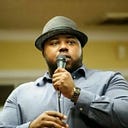On the Sainthood of George Floyd
One year ago today, George Floyd was murdered at the hands of the Minneapolis police. Like many on that horrific day, I was shocked to my core as I watched the video continually being replayed by the media. I saw and heard the cries of a man who, only nine minutes later, would be lifeless. It was a modern-day lynching, in which the noose and lynching tree were replaced by an officer’s knee and the pavement. The horror of that day will live in the minds of countless people forever.
But as despicable as May 25, 2020 was, nothing bothered me more than the vitriol and victim-blaming that ensued. In the days after his murder, many rushed to dehumanize George Floyd as a means of stomaching what they had just witnessed. When Black life is taken at the hands of the police, there is often a rush to determine the character of the murdered person. This rhetoric is designed to protect the image of whiteness and blue lives, forsaking justice by digging up someone’s past in order to make their murder somehow justifiable.
As the video of George Floyd’s murder was being shared and seen around the world, many political attention seekers were quick to shift the blame from Officer Chauvin to Floyd himself, saying that he was a criminal and a “horrible human being.” One person, sharing a list of his prior actions, said that she “refuse[d] to accept the narrative that this person is a martyr.” These words, echoed across millions of views and shares, encouraged people to not be dismayed at the horror they had witnessed, because, after all, George Floyd was no saint. Or was he?
Over the past year, as I’ve continued to reflect on this incident and its aftermath, I see things differently. If others feel the verdict is still out on his character, I would like to state my case: not for sinner, but for saint. I don’t say this to be provocative. A saint is someone who performs a miracle, or who is prayed to and a miracle happens. And when I think of George Floyd, I see his miraculous legacy more than anything he may have done in his past.
In the moment of his arrest, he could have responded like many citizens who feel that their rights are being violated: by fighting back. When you are not given the benefit of the doubt, not treated as innocent until proven guilty, it is easy to feel outraged. And with his stature — six foot four, and over two hundred pounds — I believe that he did have the choice. But no, George Floyd did not put up a fight. He did not allow the police an opportunity or justification to shoot him. He laid himself down and allowed them to get on top of him, the cumulative weight amounting to something over six hundred horizontal pounds on his body. And even this weight could not stop him from using the last bit of oxygen to cry out to the heavens, to make a case for his humanity, to utter his last but most powerful words.
In the moments before his death, George Floyd cried out to an angel — his mom, who had passed two years prior. That cry! Heard up in the heavens and reverberated around the globe, from Minnesota to New Zealand to Palestine. It tore the veil from the eyes of millions. Some have said that when he cried out, mothers around the world heard it as if he were their own child. It was that cry that awakened so many, that cry which moved white allies through the streets of America like an avalanche, on a scale Black people had never seen before. But the miracles didn’t end there. For the first time, we saw officers denouncing the heinous acts of their colleagues. Good cops, even several chief of police, quickly went to social media to separate themselves from the bad apples. It was the breaking of an allegiance that had previously been tighter than any bond. Yet, Saint Floyd had done it!
In the 244 years of our nation’s history, there has never been a response to an injustice at the hand of law enforcement like there was for George Floyd. The scale of protests, the growth of anti-racist trainings and groups, and increase in vocal white allyship, was unprecedented. George Floyd laid down his body and his life at the hands of police, and in doing so — in crying out in his final moments to his mom, in showing his humanity in the face of inhuman injustice — he lit a fire of hope that grew into a miracle.
In the year since his unlawful, unjust death we have seen the conversations around race and justice in the United States change in ways they never have before. People have formed numerous accountability groups, nonprofits and police oversight commissions, to name a few. But most importantly, people have committed their lives to justice. Because without justice for all, there is no peace for all.
While the events that happened this past year were unprecedented, we still have a long way to go. Yet, because of the sacrifice of St. George Floyd, we are a few steps closer to an America we have always hoped for, the one we dream of: the America where everyone, no matter the color of their skin, can breathe freely.
